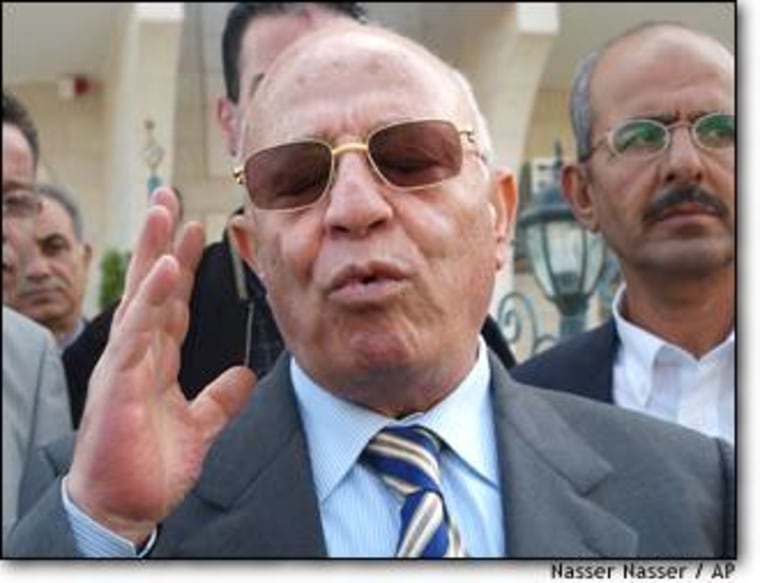In another blow to Palestinian Prime Minister Ahmed Qureia’s leadership, Yasser Arafat appointed a senior official from the ruling Fatah party as acting security chief, an official said Monday. Meanwhile, U.N. officials said Israel’s three-day military operation in a Gaza Strip refugee camp left about 1,500 Palestinians homeless, the largest demolition of houses in a Gaza raid in three years of fighting.
Arafat appointed Hakam Balawi to the security post, a Palestinian official said on condition of anonymity. Qureia, who had supported another candidate, has told Fatah he wants to quit once the term of his temporary government expires in about three weeks because of sharp disagreements with Arafat. However, with the deadline three weeks off, there is still time to settle the differences, Palestinian officials said.
Israeli troops withdrew from the Rafah refugee camp on the Gaza-Egypt border Sunday, after a three-day operation the military said was aimed at finding and destroying weapons smuggling tunnels. Three tunnels were shut down.
The raid, the biggest in Gaza in six months, was accompanied by heavy fighting between soldiers and Palestinian gunmen. Eight Palestinians, including two children, were killed, and dozens were wounded.
The U.N. Relief and Works Agency, which cares for refugees, said Monday that about 1,500 Palestinians were left homeless in the raid, the largest-scale demolition of houses in a single operation in Gaza in three years of fighting.
“We have had very, very significant damage to the refugee camp,” Peter Hansen, the commissioner general of UNRWA, said after inspecting the damage Sunday. “Many houses, maybe as many as 120, have been completely demolished.”
Another 70 houses were damaged, said Saed Zoarub, the mayor of the town of Rafah next to the camp.
LARGEST-SCALE DEMOLITION
The area targeted was the camp’s Yabena neighborhood, next to the Gaza-Egypt border.
InsertArt(2039867)Several of the houses were blown up, while the remainder were razed by army bulldozers. It was the largest-scale demolition in a single raid since the outbreak of Israeli-Palestinian fighting three years ago.
Rafah has been repeatedly targeted by Israeli troops.
In all, 3,500 houses have been demolished in the Gaza Strip in the past three years, including 1,200 in Rafah, municipal officials said.
The Israeli military said it did not know how many houses were demolished in the latest Rafah raid, but that about 30 of the structures were uninhabited and used as cover by gunmen.
The military said that other houses were razed because they were sitting atop or near tunnels. Also, some structures were damaged in the fighting, the army said, noting that Palestinians fired grenades and anti-tank missiles and that soldiers returned fire.
Palestinians charged that Israel was trying to bury peace efforts with the Rafah raid. “This is a classic war against the Palestinian people,” Palestinian Foreign Minister Nabil Shaath said Sunday.
The raid was part of stepped-up military activity following an Oct. 3 suicide bombing that killed 20 Israelis in a restaurant in the port city of Haifa.
Military officials said Palestinians planned to use the tunnels to bring in more advanced weapons, like anti-aircraft missiles, that could have a strategic impact on the conflict.
PALESTINIAN PM SAYS HE’LL QUIT
Qureia, meanwhile, said after days of bitter quarreling with Arafat that he would not continue in office after his Cabinet’s term expires in three weeks.
InsertArt(2039863)Part of the argument was over who would serve as interior minister and de facto security chief. Qureia had supported Nasser Yousef for the job, but Arafat blocked the appointment because he felt Yousef defied him by refusing to be sworn in as part of the emergency Cabinet last week.
The tension between Arafat and Qureia reflects disagreement over the amount of control Arafat would retain over Palestinian armed forces, as well as procedural and personal issues. Israel and the United States insist that Arafat hand over authority, charging that he is tainted by terrorism.
Palestinians deny that and note that Arafat is their elected president — although the term he won in a 1996 vote has formally expired.
Speaking after a meeting of Fatah leaders, Qureia would say only that a new government would be formed in about three weeks “with a new prime minister, too.”
If Qureia follows through with his threat to quit, he would be the second prime minister to give up the job amid disputes with Arafat in two months, casting doubt on whether Arafat is willing to give up enough power to allow any premier to succeed.
The office of prime minister was created earlier this year under pressure from the United States and Israel — who sought to marginalize Arafat and create a more acceptable negotiating partner for Israel.
The United States had hoped the prime minister would implement the “road map” peace plan, which envisions the creation of a Palestinian state by 2005.
But the first man Arafat appointed premier, Mahmoud Abbas, lasted only four months, resigning Sept. 6 after being caught between Israeli demands for a crackdown on militants and Arafat’s refusal to give up power over security forces.
OTHER DEVELOPMENTS:
Prime Minister Ariel Sharon said in an interview published on Monday that an Israeli businessman held by Lebanese guerrillas may be put on trial in Israel for possible wrongdoing. Israel and Hizballah are in advanced stages of negotiations for the exchange of businessman, Elhanan Tannenbaum, and the bodies of three Israeli soldiers, for hundreds of Lebanese and Palestinian prisoners held by Israel.
Aides to Arafat told Reuters that he had fully recovered from illness. Arafat, 74, took ill last month and scaled back his appearances as doctors arrived from abroad to tend to him, prompting a swirl of unconfirmed reports that he had suffered a heart attack or had stomach cancer.
